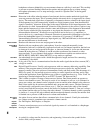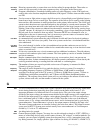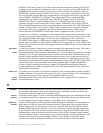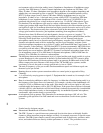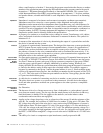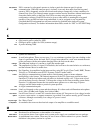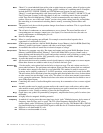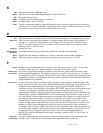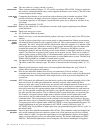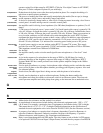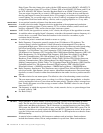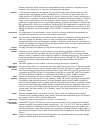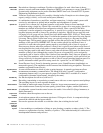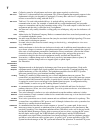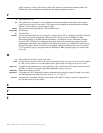
Glossary143
N
NAB
National Association of Broadcasters.
NABET
National Association of Broadcast Employees and Technicians.
NEC
National Electrical Code
NEMA
National Electrical Manufacturers Association
Nibble
A nibble is half a byte or four bits.
Noise
Usually an unwanted sound or signal that interferes with a sound or signal normally present in a
system, device, or circuit. Sometimes a special noise source such as a pink noise source or a white
noise source is used to test a system or acoustically test a room.
O
Ohm
The electrical unit of resistance. One volt will maintain one ampere of current through one ohm.
Ohm’s Law
This law relates the electrical parameters of voltage, current, and resistance. The symbol for
voltage is V*, current is I, and resistance is R. Voltage, V=I*R. Current, I=V/R. Resistance,
R=V/I. *An older symbol or term for voltage is E. E is also the symbol for the Electric field,
which has units of volts per meter.
Omega (Ω)
Symbol for ohm.
Omnidirectional
Microphone
A microphone that picks up sound from all directions with the same amplitude.
Option
Options are extra features available (for a price) on intercom and pro-audio equipment.
Output
The useful signal (voltage, current, power) produced by a system, device, or circuit.
P
Paging
Making a voice announcement over a sound system. The sound system is “P.A.” in the sound
contractor world, and “SA”, Stage Announce, in the television / theater world.
Parallel Circuit
or Connection
In a circuit, the paralleled elements would be across the same voltage and the currents would
divide amongst the elements. This kind of connection can apply to circuits, devices, or systems.
For example: two RTS™ Systems TW Intercom Systems can be paralleled, by coupling with the
appropriate capacitors, and switching each system power supply(ies) from 200 ohms to 400 ohms
on the channels to be paralleled.
Party-Line (PL)
A Party-Line (also called a conference line) is a group of intercom ports which can always talk
and/or listen to each other. Party-Lines have default names PL01, PL02 etc. These names can be
changed to more meaningful names using Other Alpha setup in AZ™EDIT. Members are
assigned to a Party-Line using Party-Line setup in AZ™EDIT. Once a Party-Line has been set up,
it can also be assigned to a keypanel key either from the configuration software or at a
programmable keypanel. This allows the keypanel operator to talk and/or listen to the Party-Line
without being a member. IMPORTANT: Do not confuse special lists and Party-Lines. A special
list is used when a keypanel operator needs to occasionally talk or listen to a group of intercom
ports that are otherwise unrelated. A Party-Line is typically used when several users of non-
keypanel devices (such as belt packs or camera intercoms) are engaged in a specific common
activity and they need to talk and/or listen to each other all the time. Keypanels are almost never
members of Party-Lines (although they can be). However, a keypanel key can be assigned to
occasionally talk or listen to a Party-Line if desired. Just remember: Party-Lines are primarily set
up for Party-Line members, with occasional access by keypanel operators, while special lists are
set up exclusively for keypanel operators to talk or listen to several unrelated intercom
poRTS™.For specific information about Party-Line setup, search for “PL” or “Party-Line” in
AZ™EDIT help.
Patch Bay /
Patchboard
A system of interconnecting audio signals. Consists of fixed connectors interconnected with
flexible “patch” cords that are cords usually with a male connector on each end.



